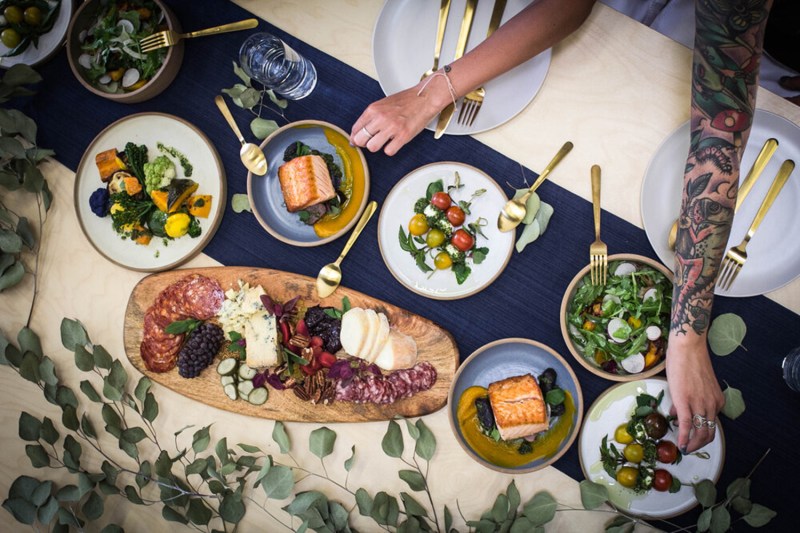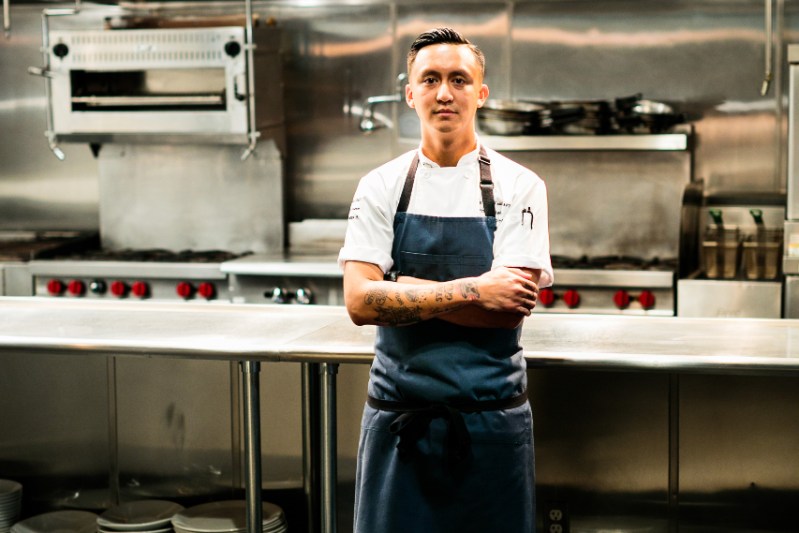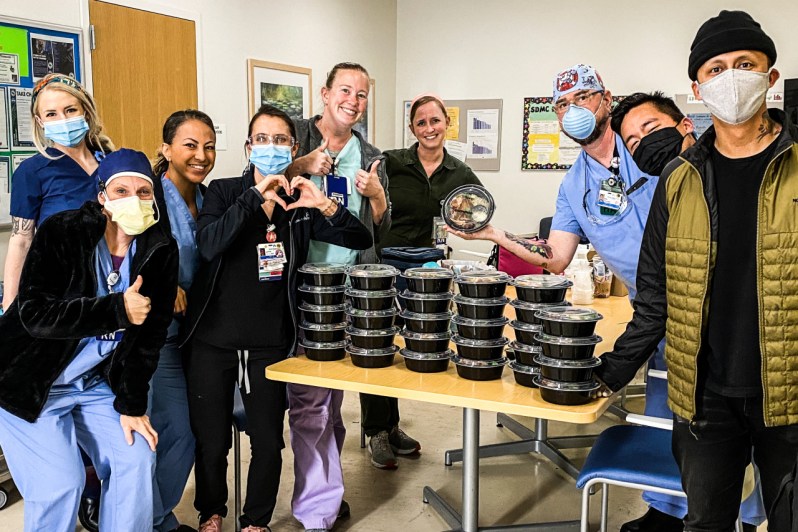
Since March 2020 almost 3,000 healthcare workers died from COVID-19, according to a December 2020 report from KHN and The Guardian. Those fatalities significantly affect immigrants, including those from the Filipino community. Immigrants from the Philippines account for 28% of the 512,000 immigrants working as registered nurses according to a 2018 report. Filipino Americans have been hit hard from the pandemic and in California, where 18% of registered nurses are at the front lines, they’re a very vulnerable group.
When the shutdown happened in San Diego, Chef Phillip Esteban got to work.“When the pandemic hit, we were getting ready to open our first brick and mortar concept,” said Esteban.
“But with the shutdown, people were out of jobs. Being Filipino, getting in direct contact with the local hospitals was very quick, since the majority (healthcare workers) are Filipino. So, we started with that.”
Craft Meals, run by Esteban, is the catering company responsible for delivering these meals. The project is just one of many under OpenGym, a self-sustaining nonprofit based in San Diego. The organization has a creative mission — it operates as a collection of projects focused on serving underprivileged communities.
Meet Chef Phillip Esteban

Esteban is a career culinary professional, with a resume spanning Eleven Madison Park, Per Se, and Momofuku Ssäm Bar. But for most of his professional career, he didn’t cook Filipino cuisine. This isn’t uncommon for many Filipino-American chefs. Compared to other Southeast Asian cuisines like Thai Food or Vietnamese, Filipino restaurants and cuisine are relatively underrepresented in the American culinary landscape.
There is a poignant discussion about Filipino cuisine happening within the Filipino-American community. For many, there’s a stigma and discomfort in their own skin, of being “too Filipino.” In Esteban’s opinion, many Filipino Americans have assimilated into American culture without having that conversation about assimilation, culture, and identity.
For Esteban, this is a familiar story. His family moved to San Diego from the Philippines and like many immigrant Asian families, they viewed the creative fields with a healthy dose of skepticism. Cooking, music, and art were hobbies, not stable careers. Because of this, Esteban grew up seeing very few people with his background in the creative fields. This lack of role models and pathways to success adds another layer of difficulty for many Filipino-Americans and minorities seeking a career in those areas.
OpenGym is Giving Back with Meals

Through a partnership with José Andrés’ World Central Kitchen (WCK), they have donated more than 100,000 meals to communities in need.
Besides Craft Meals, Chef Esteban also runs White Rice, a Filipino breakfast and rice bowl concept seeking to explore and educate customers on Filipino cuisine. Filipino breakfast is meat centric, focused on items like sweet longanisa sausage with savory garlic rice, all accented with a fried egg. At White Rice, Esteban combines these traditional Filipino flavors with modern techniques and ingredients. It’s this aspect of showcasing Filipino flavors that’s deeply personal to Esteban.
Esteban and White Rice represent a new generation of Filipino American chefs — culinary entrepreneurs trying to push Filipino cuisine into the American culinary conversation. Why shouldn’t Filipino food have a seat at the table alongside other cuisines like Korean or Thai? In Philip’s case, he has already started to see the effects of his work. “There’s an excitement of just trying something new,” said Esteban.
“People say ‘hey you guys are making Filipino food cool. Thank you.’ For the young cooks, that young Filipino American that isn’t in touch with Filipino culture because of the stigma of being too Filipino. This is bridging that gap.”
This balance of community, Filipino culture and sustainability drives Esteban’s work. The pandemic has caused seismic waves in the food industry as countless restaurants have shuttered. For many workers in the restaurant industry, the job has always been a stopover, a temporary position before another career. Some of these workers are likely to never come back, further exacerbating the ability of restaurants to find suitable employees.
For some restaurant professionals like Esteban, the nature of the work itself has changed. Many chefs pride themselves on working long hours — 12-16 hour days can be the norm, seen as a badge of honor. In Esteban’s case, his culinary projects have challenged that status quo. Since the beginning of the pandemic, he and his workers have always consistently finished work at 5 p.m, placing a premium on maintaining a more sustainable work-life balance.
At the center of all Esteban’s projects is his connection to Filipino culture, ranging from the initial catering connection of Filipino hospital workers to the cultural pride of White Rice.
“There’s a term that we learn called bayanihan, which means the spirit of community,” said Esteban. “My family has told me stories about my grandfather building the first school in their province or cleaning the sewer drains before a rainstorm to avoid flooding. A lot of people ask, ‘is this just a higher calling?’ But at the end of the day it’s just being bayanihan. It was just being Filipino.”
How You Can Support

If you’re in the San Diego area, you can order meals from Craft Meals Catering or White Rice. You can also shop OpenGym x Mikkeller Super Cozy sweatshirt collection.
This feature is part of our Brands Giving Back Series, where we’ll bring you all the latest news on brands that are giving back to the community, and how you can support them by shopping online.



